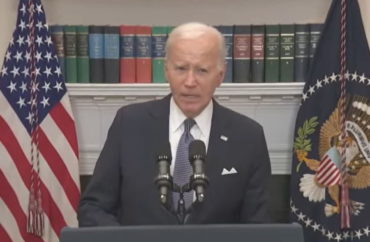
OPINION: Biden barks up the same tree, just in time for presidential election season
Did anyone in the Biden administration actually read the Supreme Court decision that smacked down the shaky and shady $430 million student loan bailout that the Democratic regime tried to foist on American taxpayers?
Perhaps they only paid attention to the dissent.
But President Joe Biden and his cronies in the U.S. Department of Education don’t seem to care what a 6-3 majority ruled last week, as mere hours after the decision was made public, a new student loan bailout plan to cancel debt was trumpeted.
“The Secretary of Education initiated a rulemaking process aimed at opening an alternative path to debt relief for as many working and middle-class borrowers as possible, using the Secretary’s authority under the Higher Education Act,” the federal agency announced June 30, the same day Biden v. Nebraska was handed down.
Originally, the Education Department under Biden argued it had the power to forgive a massive swath of loan debt under the 2003 Higher Education Relief Opportunities for Students, or HEROES, act, which states the education secretary “may waive or modify” student loan debt “in connection with a war or other military operation or national emergency.”
As the Supreme Court ruled last week, however: “The Secretary asserts that the HEROES Act grants him the authority to cancel $430 billion of student loan principal. It does not.”
“We hold today that the Act allows the Secretary to ‘waive or modify’ existing statutory or regulatory provisions applicable to financial assistance programs under the Education Act, not to rewrite that statute from the ground up.”
Now the Biden administration is arguing the Education Department has the authority to erase massive debt under the overall Higher Education Act of 1965. Again, they are basically trying the same tactic — even though the Supreme Court’s ruling specifically warned against such massive unilateral financial action by a federal agency.
“Among Congress’s most important authorities is its control of the purse,” the ruling stated, adding the appropriations clause is “a most useful and salutary check upon profusion and extravagance.”
“It would be odd to think that separation of powers concerns evaporate simply because the Government is providing monetary benefits rather than imposing obligations,” the Supreme Court majority ruled, adding “our precedent—old and new—requires that Congress speak clearly before a Department Secretary can unilaterally alter large sections of the American economy.”
In another round of deja vu, several law scholars told Bloomberg this new plan will definitely face litigation.
“I have no doubt that any relief under the Higher Education Act will face a spate of lawsuits, essentially pitching the same claim — that the administration acted outside of its statutory authority,” Steven Schwinn, a professor at the University of Illinois John Marshall Law School in Chicago, told Bloomberg, which added:
Although the court’s ruling was based on the Heroes Act, the opinion signaled implicitly that the language in the Higher Education Act would not be considered as a valid basis for the scope of student-debt relief Biden initially sought, according to Jed Shugerman, a professor at Boston University School of Law.
“It wrote this decision in a way that is meant to preview for federal courts, both the Roberts’ Court or lower courts, the same reasoning that would strike down the waiver based on the Higher Education Act,” Shugerman said.
But the new Biden plan will take time — enough time to make its way into the 2024 presidential election campaign season, of which the president — if he’s healthy enough — intends to take part in as the nominee for the Democrats.
As The Wall Street Journal reported June 30: “The president’s efforts to revive sweeping debt cancellation will keep the issue alive heading into the 2024 campaign season. But the new plan may not be implemented before next year’s election, some legal scholars said. Debt forgiveness is popular among young voters, who turned out in large numbers in the recent midterm elections.”
It’s just another tactic by a progressive politician to promise to be young voters’ sugar daddy instead of standing on principles such as responsibility, hard work and wise decision-making.
MORE: Supreme Court strikes down Biden’s student loan bailout





Please join the conversation about our stories on Facebook, Twitter, Instagram, Reddit, MeWe, Rumble, Gab, Minds and Gettr.